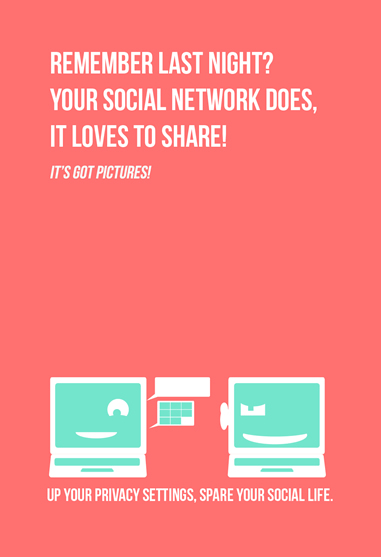Campus Security Awareness Campaign 2016
This post is part of a larger campaign designed to support security professionals and IT communicators as they develop or enhance their security awareness plans. View the other monthly blog posts with ready-made content, as well as a printable calendar with the 12 topics. Learn more.
More adults are using social media to stay connected both personally and professionally, which means recruiters (for college, sports, and jobs) may be using social media more frequently to assess candidates’ qualifications. The type of information shared on social media can also provide fodder for phishing attacks and even identity theft, or allow people to make assumptions about you based on the groups that you are affiliated with. Use this month’s ready-made content to remind your users to check their social media privacy and security settings frequently to ensure careful online reputation management.
Get the Word Out
Newsletter Content
You should understand how to present yourself on social networking sites and how to safeguard your information. What many may consider temporary or fleeting will most likely remain on the Internet forever. As a result, keep these dos and don’ts in mind when sharing online.
Dos
- Ask questions about who can access the information you are posting online, who controls and owns the information, and what is shared with third party.
- Maintain a backup of the content you post on professional networking sites (e.g., LinkedIn).
- Understand the default privacy settings on the social networking sites you use and how to change them to match your comfort level.
- Keep your personal information private. Assess whether it’s necessary to share sensitive information such as your birthday, mailing address, phone number, e-mail, mother’s maiden name, sexual orientation, or Social Security number.
- Be cautious about accepting requests to connect online. Connect only to people you trust who will not misuse the information you post.
- Check the location settings on photos and videos you post to social networking sites.
- Avoid joining online groups where you don’t know all the members or what they stand for.
- Use passphrases to protect your social media accounts. A passphrase is a set of words that create a phrase that is 20 to 30 characters long.
Don’ts
- Don’t share too much information that could be used to complete a profile about you. For example, share your birthday, but not the year you were born. Or share your hometown, but not the address where you live.
- Don’t share any information that is being used for verification purposes such as your mother’s maiden name, the name of your first pet, or the street where first lived. Consider making up alternate answers to those questions that only you would know.
- Don’t post when you are traveling or going out of town on vacation. It’s an open invitation letting criminals know that you are in a different location and that your home is vacant.
- Don’t post photos of inappropriate or illegal activities.
- Don’t click on attachments or links without checking the source.
- Don’t “check in” to every place you visit. That information could be used to identify you in a vulnerable location.
- Don’t use weak passwords, and never share your passwords!

Use this image to support your message (click for larger image).
Social Posts
- Our general rule: Never post anything #online you wouldn’t want your grandmother to see! #SocialMediaSafety
- Or to put it another way, if you wouldn’t want to see it on a billboard, keep it offline. #SocialMediaSafety
- The Internet is forever. Protect your online reputation—your older self will thank you! #SocialMediaSafety
- Keep your personal information private. Assess whether sensitive info is really necessary to share. #SocialMediaSafety
- Remember to check your social media privacy & security settings often! #SocialMediaSafety
E-Mail Signature
Ask staff to add a tip to their e-mail signature block and link to your institution's social media etiquette or online reputation management guidelines.
Example:
John Doe
Chief Information Security Officer
University of XYZPractice Good Social Media Etiquette & Proactively Manage Your Online Reputation. Learn more. [Link “Learn more” to your institution’s social media etiquette page or acceptable use policy.]
Embed or Share Videos
Resources
Share these resources with end users or use them to inform your awareness strategy.
- Remember Last Night? Your Social Network Does! (poster) [Use something like this for caption above and link picture to Pinterest post.]
- Learn how to protect yourself and your devices with these tips and resources from StaySafeOnline.org.
- The Carnegie Cyber Academy offers suggestions for protecting your personal information.
- US-CERT also provides tips for staying safe on social networking sites.
- Read a book on the topic: lol...OMG! What Every Student Needs to Know About Online Reputation Management, Digital Citizenship, and Cyberbullying or Digital Drama: Staying Safe While Being Social Online.
- Read Jobvite’s findings in Welcome to the 2015 Recruiter Nation, Formerly Known as the Social Recruiting Survey.
- Social Networking Fact Sheet (2014), Pew Research Center
Brought to you by the Awareness and Training Working Group of the EDUCAUSE Higher Education Information Security Council (HEISC).
© 2016 EDUCAUSE. This EDUCAUSE Review blog is licensed under the Creative Commons BY-NC-SA 4.0 International license.
